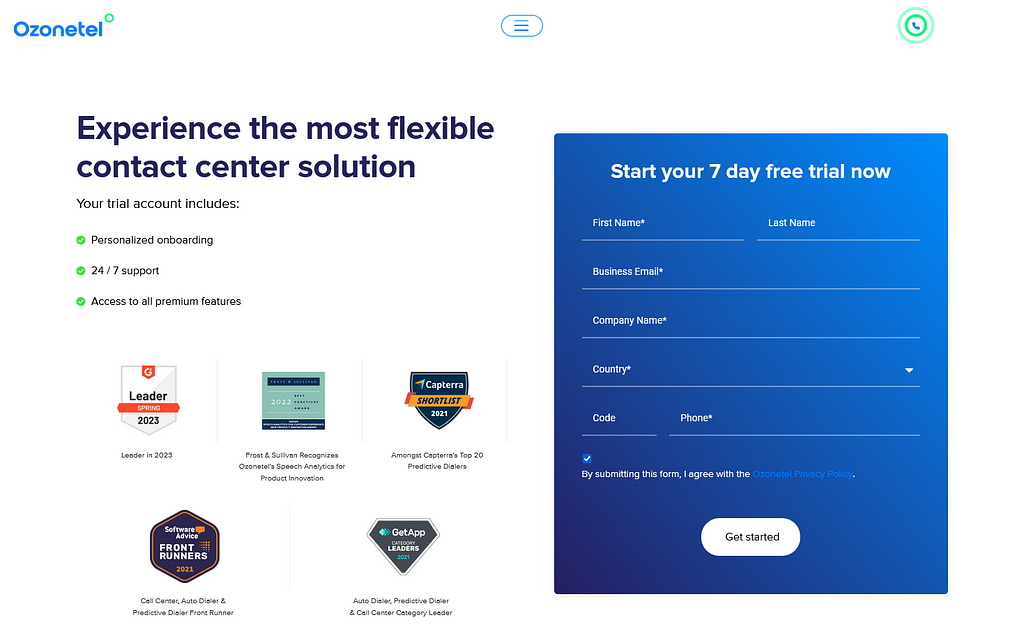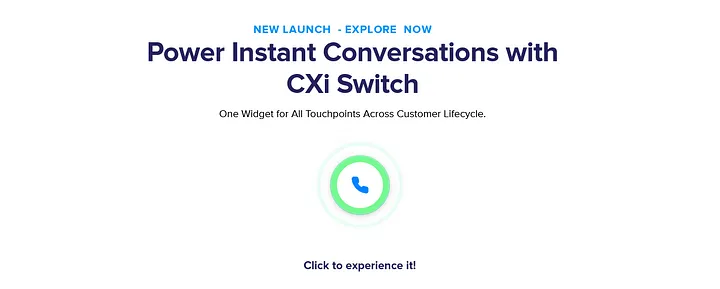- Resources
- How to Successfully Use WhatsApp for Marketing: A Complete Guide
How to Successfully Use WhatsApp for Marketing: A Complete Guide

In the past few years, consumer behavior has evolved in unexpected ways. Post-pandemic, online interactions have become immensely popular and creating meaningful experiences through these interactions is playing a decisive role in securing customer loyalty.
Customers expect the same level of personalization and interaction online, as offline. Technology advancements like AI-powered chatbots and conversational platforms like WhatsApp are helping brands personalize customer conversations, at scale.
But while conversational marketing has become an indispensable component of every company’s marketing strategy today, is it really a new phenomenon?
In this article, we will explore:
- 1. What is Conversational Marketing
- 2. Why Is Conversational Marketing Critical Today?
- 3. Why Is WhatsApp an Important Conversational Marketing Tool?
- 4. WhatsApp Marketing Campaign: Best Practices
- 5. Examples of Successful WhatsApp for Business Marketing - 6 Case Studies
- 6. Ramp Up Your Marketing with Ozonetel’s CCaaS Platform on WhatsApp
What Is Conversational Marketing?
At its core, conversational marketing is a personalized exchange of communication with customers — for engaging them, building brand loyalty, and increasing sales. While traditionally, this was done via face-to-face interactions and phone calls, in the era of rapid digitization, the dynamics have changed.
Today, mobile-first consumers discover new products through social media platforms like Instagram and use media like chat and WhatsApp to make purchases. A Forrester survey suggests that almost 50% of US adults chat with a brand to make a purchase. And that number increases as the demographics’ age decreases.
Another survey suggests that globally, over 64% of consumers prefer messaging to communicating with brands. Unsurprisingly, conversational marketing also features prominently in Gartner’s latest hype cycle report.

Source: Gartner
Why Is Conversational Marketing Critical Today?
Conversational marketing helps build personal relationships at scale and offers brands multiple ways to differentiate the customer experience.
1. Building Deeper Connections. A survey found that 71% of customers wanted brands to chat with them in real-time. Apps like WhatsApp and AI-powered chatbot help brands have real-time conversations with customers and sometimes, offer solutions on call.
2. Making Customers Feel Heard. Conversational marketing enables brands to create personal connections with their customers. The aim is to make the customer feel heard. Live chat allows brands to interact with customers in real time and solve their issues. No wonder, 51% of customers say live chat support is one of the major reasons for repeat purchases.
3. Empowering Them with Two-way Conversations. Unlike traditional marketing media like advertisements, social media posts and videos, that have one-way messaging, conversational mediums like WhatsApp, chatbots, and messenger apps help brands conduct a dialog with the customer.
Why Is WhatsApp an Important Conversational Marketing Tool?
Over the last few years, WhatsApp has gained immense popularity as a conversational marketing tool across industries. One of the reasons for its popularity is the scale that WhatsApp allows brands to achieve; it has over 2.2 billion monthly active users. Additionally, WhatsApp has an extremely high engagement rate—the open rate is 98% and the click-through rate is 45-60%. For marketers, these are dream numbers.
And these messages aren’t restricted to conversations between family, friends, and colleagues. According to Meta, a whopping 175 million messages are sent to WhatsApp business accounts every day.
Increasingly, studies find, people want to communicate with businesses the same way they communicate with friends and family.
Here’s how WhatsApp helps brands build these personal connections.
- Real-time Communications
- Personalization
- Rich-media Engagement
- Accessibility
- Automation
Real-time Communication
WhatsApp gives brands an opportunity to respond to customer inquiries, offer support, and resolve issues swiftly. Take, for example, Hindustan Unilever’s Pureit which allows customers to book a service request through the app itself. A few years ago, customers had to wait endlessly on customer care numbers to do the same. Now, they can do it at the tap of a finger.


Personalization
WhatsApp Business API can integrate with the company’s CRM and leverage the data here to personalize customer communications and offer customized recommendations based on their shopping history or demographic data. Personalized communication and offers make a customer feel valued, leading to stronger relationships and higher customer retention rates.

Rich-media Engagement
WhatsApp provides marketers with a platform to engage customers through multimedia messages, including photos, videos, and voice notes. Multimedia messages create a more engaging and interactive experience, increasing the chances of customers responding and engaging with the brand.

Accessibility
WhatsApp is widely accessible, allowing marketers to reach customers from different parts of the world through a single platform. Marketers can use WhatsApp to communicate with customers in their preferred language, providing a seamless experience that enhances customer satisfaction.

Automation
WhatsApp provides marketers with automation tools that enable them to send automated messages, such as welcome messages, reminders, and notifications. Automation saves time and enables marketers to engage with customers even when they are not online, ensuring that no opportunities are missed.

WhatsApp Marketing Campaign: Best Practices
Yes, customers want the convenience of messaging a brand on WhatsApp, but brands must remember that WhatsApp is, first and foremost, a personal space. Customers use WhatsApp primarily to stay in touch with their family, friends, and colleagues, and they do not want their WhatsApp chat list to be cluttered by brands!
There are some fundamental practices that businesses must follow to ensure that their customers feel at ease while using WhatsApp as a channel.
- Get Permission: It is essential to respect their privacy and give them control over the messages they receive. You can use opt-in forms or ask for permission during onboarding.
- Provide Value: If your message is not offering any value to the customer, don’t send it. Brands need to ensure that their messages are relevant, personalized, and useful. This could include personalized offers and status updates. Brands can also make WhatsApp more valuable for customers by using the channel to offer them prompt customer support.
- Maintain a Conversational Tone: Speak to customers in a manner they enjoy. Avoid marketing jargon and keep the language simple and easy to understand. Using emojis is highly recommended.
- Timing is Everything: Timing is crucial when it comes to using WhatsApp for Business marketing. Don’t send messages at inconvenient times when your customers are busy or sleeping. Use tools like WhatsApp Business API to schedule your messages at the appropriate time.
- Keep It Conversational: Marketeers should avoid using WhatsApp broadcast channel and instead use it to encourage interactions and conversations. Customers prefer interactive menus, automated replies, and prompt routing to a live representative when needed.
Examples of Successful WhatsApp for Business Marketing – 6 Case Studies
WhatsApp has become an important marketing tool across industries. There were over 50 million WhatsApp Business app users in 2020 and that number grew to 1.2 billion in a year. Last year, WhatsApp Business was downloaded 292 million times on Android and iOS.
How businesses leverage their WhatsApp marketing strategies.
- Muthoot Gold Scales Up Its Marketing Operations
- Healthians Streamlines Patient Communications
- Flipkart’s “A Personal Shopper” WhatsApp Campaign
- IMC Simplifies Patient experience with WhatsApp for Marketing
- 21K School Boosts New Customer Acquisition by 72% in 11 Months
- Kaarva Utilizes WhatsApp to Engage and Support Over 100,000 Customers
Muthoot Gold Scales Up Its Marketing Operations
In 2020, when Muthoot Group planned to scale up its gold ornaments business. It saw a huge challenge in physically storing its entire catalog of products at brick-and-mortar stores due to limited inventory. The company decided to use its existing Muthoot finance outlets to reach out to customers. However, distributing the printed catalogs and promotional material across our 5000 branches was a humongous challenge.
The conglomerate used Ozonetel’s CCaaS Platform on WhatsApp to overcome this challenge. The solution Muthoot Gold deployed:
- Intelligent WhatsApp Product catalog
- Conversational shopping experience
- Superlative workflow & customization options
Sharing the group’s journey with Ozonetel, Mr. P.C. Haridas, Head, Muthoot Gold said customers want live discussions, and personalized attention. It’s difficult to p Due to limited inventory, it’s difficult to physically store your entire catalog of products at brick-and-mortar stores due to limited inventory. And that’s where Ozonetel came up with its WhatsApp solution. We were able to deploy our entire digital catalog on WhatsApp chatbot instantly.
“WhatsApp became a part of Muthoot’s go-to-market strategy where we could reach out to customers located in various parts of the country. Ozonetel’s WhatsApp solution has been of great help in terms of cost of operation and ROI, and it will remain the cornerstone of their business in days to come, “he added.
Healthians Streamlines Patient Communications
Health tech startup Healthians wanted to generate leads & engage patients across voice & digital channels. The company recognized that its patients came from diverse backgrounds and had different communication preferences. They may hesitate to ask questions & have misconceptions regarding diagnostic tests.
The platform used Ozonetel’s One Business One Number Solution to provide a consistent point of contact across channels. Connecting the same agent across calls & WhatsApp helped build trust resulting in meaningful engagement & higher conversions. Integrating the solution with CRM, the health tech brand efficiently manages hospital and home appointments.
Flipkart’s “A Personal Shopper” WhatsApp Campaign
Flipkart, an Indian e-commerce company, wanted to generate excitement for its upcoming online sales event, “Big Billion Days” by capturing the attention of a wide audience. To achieve this, they sought an effective marketing channel that could break through the clutter and encourage meaningful engagement and conversions. WhatsApp emerged as the ideal platform for this purpose.
They designed an interactive conversational experience inspired by India’s iconic television quiz show, “Kaun Banega Crorepati” (KBC), featuring legendary Bollywood actor, Amitabh Bachchan, as the host. In this campaign, Bachchan personified a chatbot, adding a unique and intriguing element to the user experience.
To enhance engagement, Flipkart leveraged the various communication formats offered by WhatsApp, including images, audio, videos, and emojis, creating rich-media interactions. Customers were encouraged to participate in puzzles and emoji-enabled games on WhatsApp, providing an entertaining way to discover more about the upcoming sale.
The campaign saw astounding results – an increase of 3.5X in conversions and $2.5 million in revenue
IMC Simplifies Patient Experience with WhatsApp for Marketing
The International Medical Center (IMC) is a cutting-edge multi-specialty hospital located in Jeddah, Saudi Arabia. With a focus on improving patient experience, IMC recognized the need to provide a seamless and convenient way for patients to manage appointments, access prescriptions & medical reports, and seek hospital information using smartphones.
Previously, IMC offered several channels to facilitate these tasks, including mobile apps, an online patient portal, and a patient support helpline. However, they sought a solution that would streamline customer service inquiries, ensuring easy navigation for patients while reducing reliance on human agents. IMC integrated a QR widget on their website, enabling patients to access the WhatsApp chatbot seamlessly across various pages. Importantly, patients did not need to download any additional apps as they already had WhatsApp installed on their smartphones.

The WhatsApp chatbot had two significant impacts on IMC’s operations:
1. Enhanced patient experience: Patients no longer endure long wait times or navigate complicated IVR systems to address basic queries. Instead, the chatbot provides immediate resolution, reducing frustration and improving customer satisfaction (CSAT).
2. Reduced burden on staff: IMC’s customer service and administrative personnel benefit from the chatbot’s ability to handle basic queries, freeing up their time to focus on more complex inquiries that necessitate human attention.
21K School Boosts New Customer Acquisition by 72% in 11 Months
21K School is an online K-12 educational institution that offers Indian, American, and British curricula to students aged 3 to 18 in India and around the world. 21K School aimed to establish a channel for addressing parental queries and engaging with them in a personalized, automated, and highly accessible manner. They sought a medium that allowed for customization, automation, and high open rates, and WhatsApp emerged as the ideal solution.
Throughout their customer journey, 21K School extensively utilizes WhatsApp, spanning awareness, consideration, purchase, post-purchase support, customer care, and re-engagement. WhatsApp serves as the primary messaging platform for business communication with customers, enabling seamless and efficient interactions.

By implementing WhatsApp strategically, 21K School has achieved remarkable outcomes, enhancing efficiency and customer experience:
3. 21K School has successfully created a personalized customer journey that is highly automated, ensuring a smooth and efficient experience for its users. Within 11 months, 21K School experienced an impressive 72% increase in new customer acquisitions, highlighting the effectiveness of their WhatsApp-based approach.
The implementation of WhatsApp resulted in a remarkable 200% increase in agent productivity, allowing the team to handle customer inquiries more effectively.
Kaarva Utilizes WhatsApp to Engage and Support Over 100,000 Customers
Kaarva is a financial health platform that aims to empower employees in achieving happiness and overall well-being at a faster pace. Initially, Kaarva managed its operations using three separate WhatsApp Business Accounts and a team of agents. Managing chats manually became impractical, hindering their goal of delivering prompt service. Kaarva needed a solution that could handle concurrent conversations with hundreds of thousands of customers while ensuring excellent support. Additionally, they required integration of these chats into their internal systems for logging transaction requests and fund transfers, which were previously time-consuming when executed manually.
To address these challenges, Kaarva leveraged WhatsApp’s Business APIs extensively in its operations. They utilized the APIs for various processes, including onboarding and confirming cash transfers. With this approach, Kaarva created a unified touchpoint for customers to engage with, establishing an automated flow and utilizing advanced customer behavior analytics.
WhatsApp became Kaarva’s primary channel for customer onboarding, engagement, and support throughout their journey. Kaarva now relies on WhatsApp for all aspects, ranging from customer acquisition to post-sales assistance. This strategic shift has enabled streamlined operations and improved efficiency. By leveraging WhatsApp’s capabilities and implementing a WhatsApp Chatbot, Kaarva successfully generated, qualified, and supported over 100,000 customers.
Ramp Up Your Marketing with Ozonetel’s CCaaS Platform on WhatsApp
WhatsApp has seamlessly solved problems in many use-case scenarios. Integrating your cloud contact center with Ozonetel’s WhatsApp Solution will help you orchestrate better customer experiences and engage your customers via a single, unified platform.
1. Hyper-personalized Experiences: Personalization is a key factor in WhatsApp for marketing. Use customer data to create personalized messages that address the customer’s needs and preferences. Our deep CRM integration enables you to run personalized campaigns at strategic touchpoints in your customers’ journey.
2. Seamless Onboarding: Our onboarding process is simple and swift. We are amongst Meta’s recognized Business Solution Providers with direct access to their cloud API. Brands can use our one-click embed flow and get started with their WhatsApp contact center in 5 minutes.
3. Flexible Automation for Lead Management
With our proprietary Conversational AI, you can fully or partially automate conversations based on your campaign requirements. Build an automated conversational flow & leverage rich media, and readymade templates to nurture leads.
4. Seamless Bot-agent Handoff for Collaborative Resolution
While automation can be useful, it is also essential to have timely human intervention. Customers want to feel like they are valued and that their concerns are being addressed. Our solution enables businesses to seamlessly route a WhatsApp conversation to a human agent using efficient automated chat distribution software.
5. Leverage Existing Investments with One Business, One Number
With our solution, businesses can continue to use their existing customer-facing number on WhatsApp. Using a single phone number for your business ensures that customers can easily reach out to you without confusion.
6. Secure Lead Data
Lead leakage is a serious issue for businesses. Using the number masking feature, you can prevent offline conversations between prospects and agents. You can also use the same virtual phone number for calls and WhatsApp chats. Using the sticky agent feature, you can also give a consistent point of contact and build trust & familiarity with prospects as well as customers.
Conclusion
Today, your customer doesn’t want you to advertise or preach to them. They want to feel heard, prioritized, and valued. WhatsApp allows you to enter their lives and their personal spaces. Marketing campaigns on this platform should be designed in a manner that is meaningful to them.
Like a successful conversation, a successful marketing campaign involves great timing, excellent content, deep respect for your customer, and a fine-tuned sensitivity to what they are saying and doing.
Marketers must follow best practices that prioritize customer preferences and expectations. These practices include obtaining permission from customers, timing messages appropriately, utilizing multimedia content effectively, offering support, and respecting privacy. But most importantly, it should leverage technology and data to add value and personalize the experience for each customer.
Prashanth Kancherla
Chief Operating Officer, Ozonetel Communications
Over the past decade, Prashanth has worked with 3000+ customer experience and contact center leaders...
Chief Operating Officer, Ozonetel Communications
Over the past decade, Prashanth has worked with 3000+ customer experience and contact center leaders to comprehensively understand the need for effective and efficient customer communications at every step of their journey with a brand. Deeply embedded in today’s CCaaS ecosystem, he has been instrumental in Ozonetel's growth and contributed in various roles including product management, sales, and solution architecture.







